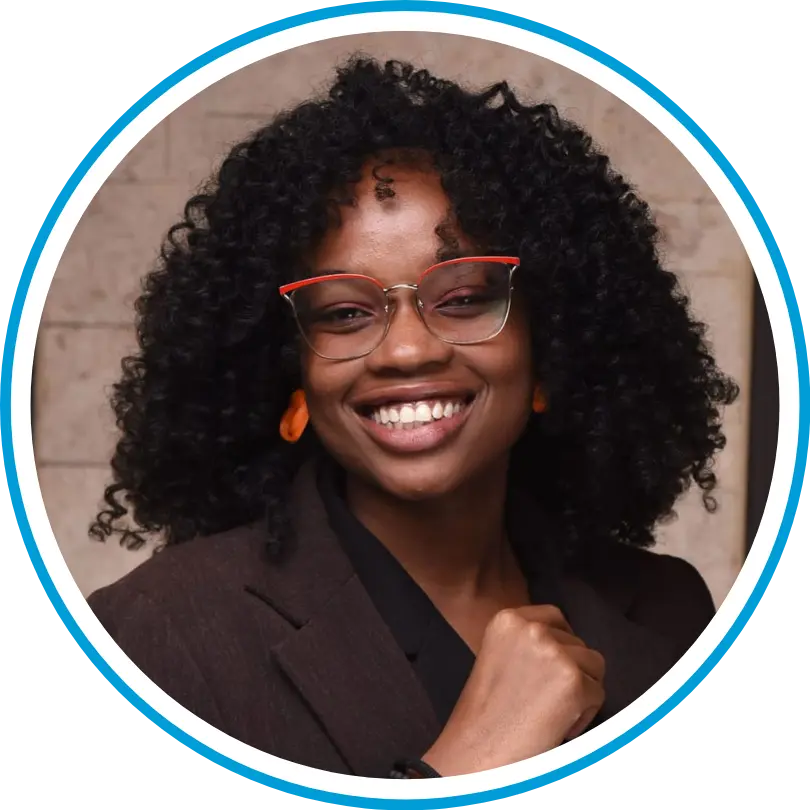Malkia John
Malkia John is a Kenyan engineer and feminist tech advocate whose work focuses on using AI, data science, and digital tools to strengthen gender-based violence response systems. As founder of Sauti Salama, she has supported over 200 survivors with access to legal aid and mental health care, while training 500+ women and girls in digital security. Her work is grounded in lived experience and a bold vision: to build a safer, more just digital future for women and marginalized communities across Africa.

What does your work focus on?
As the Founder of Sauti Salama, I lead a platform that enhances GBV response systems in Kenya using AI, machine learning, and secure digital tools. We provide survivors with discreet access to legal aid, psychosocial support, and emergency services. Our AI chatbot offers verified information on GBV rights and safety planning without collecting survivor reports, ensuring anonymity and safety.
Beyond individual support, we use machine learning to map GBV hotspots, helping policymakers and service providers allocate resources more effectively. Recognizing the threats of online gender-based violence, we train women, LGBTQIA+ individuals, and other marginalized groups in digital security, cybersecurity awareness, and online privacy.
Our mission is to close gender gaps in digital access and leadership. I’ve trained over 500 women and girls in digital literacy, cybersecurity, and AI ethics. We ensure language, literacy, and accessibility challenges don’t prevent survivors from accessing vital information. I’ve also contributed to global discussions on gender-responsive AI and tech safety at COP28, COP29, and ITU forums.
What is the impact and scalability?
Since its inception, Sauti Salama has connected over 200 survivors to legal aid, mental health services, and emergency support. We’ve created a secure, stigma-free space for LGBTQ+ individuals and marginalized women to access critical resources. Our digital safety training has equipped more than 500 women and girls to navigate cyber harassment and online GBV.
Our machine learning-powered risk maps have influenced urban safety and digital violence policy by identifying and reporting unsafe locations. As we scale, we’re expanding AI-driven tools to strengthen women’s safety, autonomy, and access to justice. This includes real-time alerts on unsafe areas and training women-led civil society organizations in digital security.
We’re also advancing gender-inclusive tech policy by using survivor data insights to push for stronger regulations on online safety. Through partnerships with feminist tech organizations, we advocate for ethical AI models that protect women’s rights. Our expansion plans include multilingual chatbots and predictive models to counter GBV trends, misinformation, and online harassment.
Looking ahead, Sauti Salama will integrate FemTech for reproductive health, financial tools for survivors, and AI-driven protection for women in humanitarian crises. Our platform is built to grow across East Africa and adapt to broader applications in digital safety and justice.

What does being selected as an ITU160 Gender Champion mean to you, and how will you use this platform?
At 20, I survived gender-based violence. The experience exposed systemic gaps in care, access, and justice. That moment shaped my path and led to the creation of Sauti Salama: a feminist tech initiative that makes survivor support safe, accessible, and anonymous. Our work ensures survivor data drives policy, not just headlines.
My background in electrical and electronic engineering allows me to integrate AI, data science, and policy for social impact. At Glow and Grow, I designed renewable energy solutions for marginalized women and youth. At Verst Carbon, I used AI to track energy use and inform smarter policy and climate action.
I have fought for African feminist and youth voices in AI ethics and digital governance at COP28, COP29, UNFPA, and the G7 Women7 Summit. Yet, women—especially from Africa, Indigenous communities, and LGBTQ+ groups—remain underrepresented in digital policymaking. This must change.
Technology is never neutral. It can liberate or exclude. I want to be an ITU160 Gender Champion to fight for AI governance grounded in gender justice, protect against digital GBV, and ensure African feminist leadership in global tech policy. At ITU, I will bring technical expertise and lived experience to ensure women are not just consumers of technology, but the architects of a safer, more inclusive digital future.